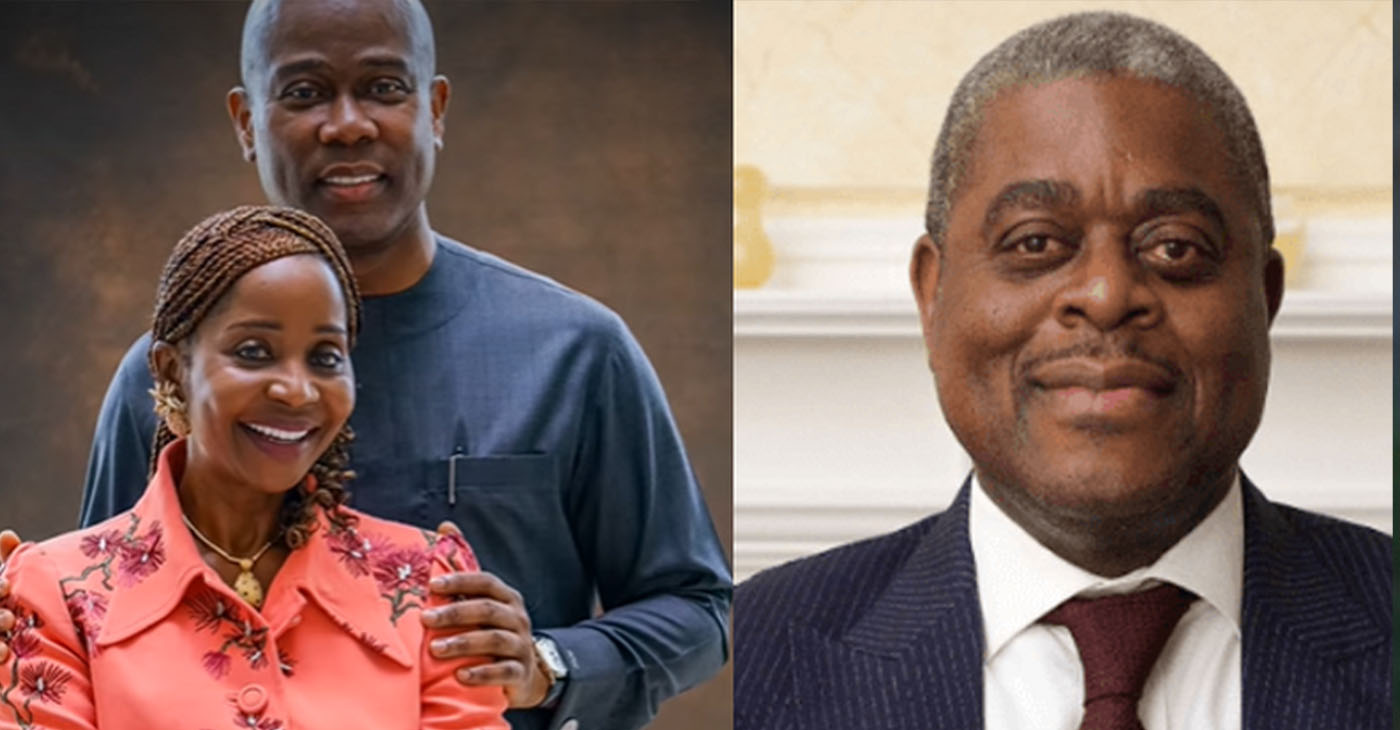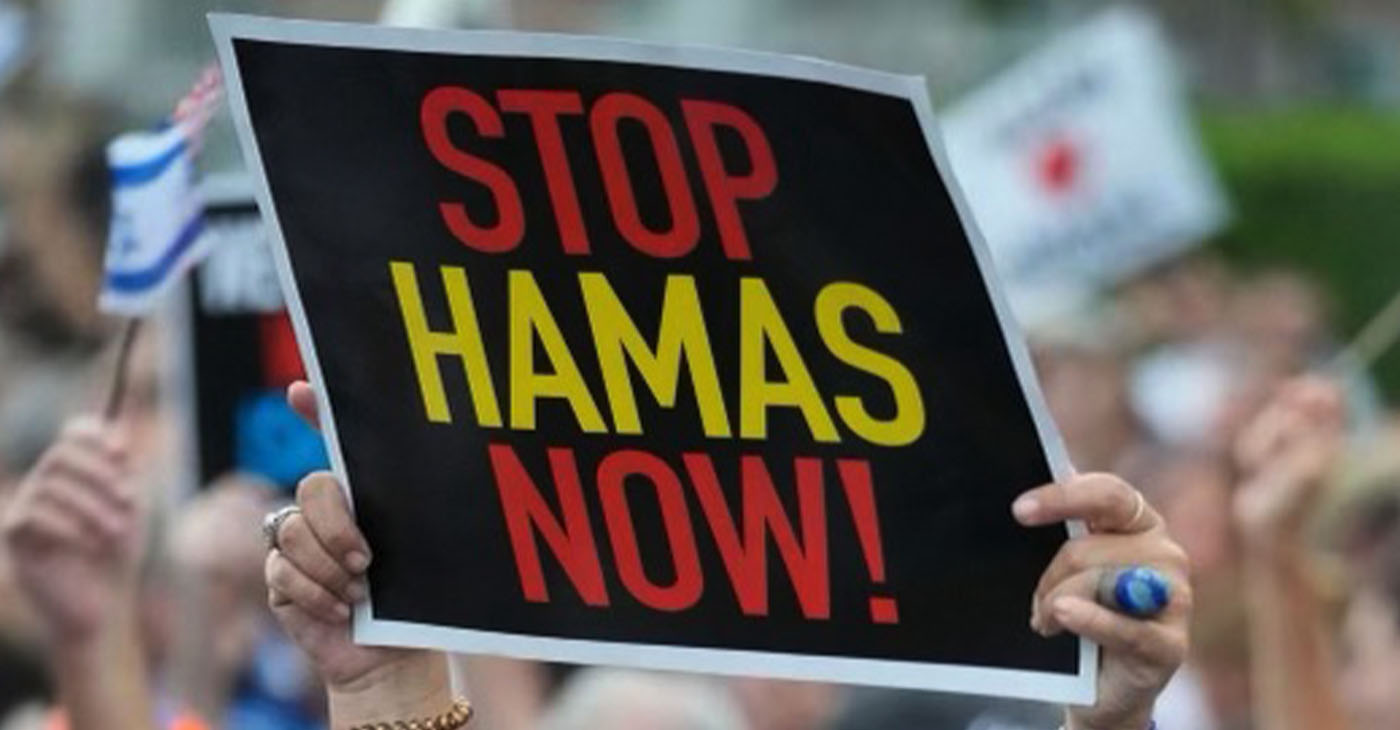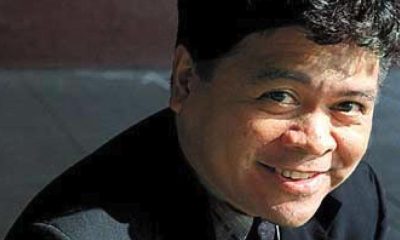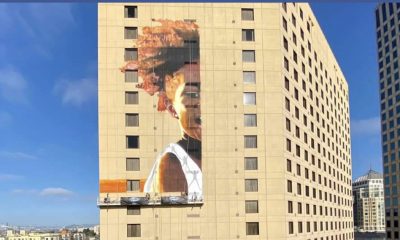World
In Sudan, Poverty, Heavy Security Grip Under Longtime Leader

In this picture taken on Tuesday, April 14, 2015, a Sudanese boy gestures to the camera for a smoke, outside his home in Izba, an impoverished neighborhood on the outskirts of Khartoum, Sudan. (AP Photo/Mosa’ab Elshamy)
MAGGIE MICHAEL, Associated Press
KHARTOUM, Sudan (AP) — During a quarter-century in power, President Omar al-Bashir has succeeded in keeping an iron grip on Sudan despite repeated disasters that would have toppled many leaders. This week’s election seems certain to entrench his rule.
Sudan lost a third of its territory as South Sudan broke away. The country has been torn by internal wars and battered by international sanctions for alleged support of terrorism. Al-Bashir is the world’s first sitting president wanted by the International Criminal Court for crimes against humanity. And poverty is a constant.
Al-Bashir’s success has come in part from a heavy security hand that has silenced dissent. Despairing of any vote breaking his grip, few Sudanese turned out for an election extended over four days that ended Thursday. But snapshots can be found of Sudan’s dissent and discontent.
IZBA
The impoverished neighborhood of Izba is one sign of how constant wars have shaped Khartoum. Before the 1989 coup that brought al-Bashir to power, Izba was a small community of Arab tribesmen who settled on the capital’s edge. But through the 1990s and 2000s, it ballooned with the Sudanese fleeing war zones around the country, particularly South Sudan, Darfur in the west and Kordofan on the border with the south.
Now 70,000 residents live crammed in about a square mile area. Half-naked barefoot children play in dusty, unpaved alleys between mud-brick houses.
The worst is during the summer rainy season, when the neighborhood floods. Residents scramble to scoop out rising water in their homes. The mud brick dissolves in the rain, damaging homes — last season, 250 houses were destroyed.
Mariam al-Mahdi’s five-room home was washed away in the night last year. “In the morning, the house was gone,” she told The Associated Press. It’s still in ruins, and the 30-year-old’s family lives in a shack nearby.
Every year, residents have to rebuild their houses. Around 80 percent of residents make only around $5 a day and are unable to afford more sturdy homes. Most men work as day laborers in construction, some of the women are tea vendors in the streets. The district has suffered from years of neglect. Public transport doesn’t reach it. There’s a single medical clinic but no hospitals, and few people have public health insurance.
The neighborhood got its first paved road just two months before this week’s election. Residents saw it as a sop from a president who has otherwise ignored them.
Abdel-Motalib Abdullah, a resident who campaigned for candidates running against the ruling party in the election, drew an analogy:
“A hunter in red clothes dug a trap for an elephant. The elephant fell in the trap and got injured. Next day, the same hunter, but dressed in white, comes and treats the elephant’s injury. This is what al-Bashir does to us.”
THE OPPOSITION
At midnight on Dec. 6, security forces descended on the home of Sudan’s most prominent human rights advocate, Amin Mekki Medani. He had just returned from the Ethiopian capital, Addis Ababa, where he met with opposition parties to work out their unified demands that al-Bashir postpone elections, form a unity government and amend the constitution.
The 76-year-old lawyer spent the next 15 days in solitary confinement, a small cell with no windows, a mattress on the floor and a neon light and air conditioning blasting non-stop.
“It was the most awful thing you can imagine,” Medani told the AP. “For 15 days … I never left the room, not knowing day from night.”
He was charged with forming a terrorist cell. For the next four months, he was in prison as his trial went on. Then last week, the charges against him were dropped and he and two other opposition figures were freed — a goodwill gesture before the election.
Over 25 years, al-Bashir has done away with what was once a vibrant opposition. His main tool has been the powerful security establishment. At the top stands the National Intelligence and Security Services, or NISS, which monitors the press, political parties, unions and public gatherings. Recent constitution amendments gave it even more power, changing its mandate from simple information gathering to give it authority as an outright security force.
“State security is the real ruler of this country,” Medani said.
Sudan saw its biggest anti-government demonstrations in September 2013. But the protests were swiftly put down by a police crackdown that killed around 200 people.
Still, Medani insists the protests signal the emergence of a young opposition that, if joined with traditional opposition parties, could force change.
“We haven’t lost the spirit,” he said.
THE GHOST HOUSE
When student activist Mohammed Salah was arrested last May, he was taken to one of Khartoum’s most notorious detention centers, known as the Ghost House. There, he told the AP, he received the “reception” given to newly arrived, political detainees. Over several days, he was systematically flogged, kicked, beaten, even bitten in the cheek, all while blindfolded and handcuffed. Once, he was hit so hard he temporarily lost sight in one eye.
He was held in solitary for 60 days, removed only for interrogations sometimes lasting more than 20 hours.
Salah was arrested for leading a university protest denouncing the killing of another student. He and his colleagues demanded the removal of so-called “jihadi crews,” groups of armed government supporters stationed at universities to crush any protests — one tool of the government to silence dissent.
Human rights groups have frequently denounced Sudan’s use of torture. Amnesty International in a report last month pointed to arrests of students, activists, rights workers and journalists from 2012-2014, some of whom faced torture and other abuses.
The arrest — and an earlier one also over protests — gave Saleh an experience in the ways of torture.
“The main concept is humiliation,” he said. Detention, he said, aims to instill fear in the detainee by controlling and isolating him.
“In the end, I keep this in my mind,” Salah said. “The death of an individual will not kill the cause.”
THE NEWSPAPER EDITOR
When the weekly newspaper Al-Midan ran a statement by a rebel group supporting protesters demanding better services, authorities quickly confiscated the edition. The paper’s chief editor, Madeha Abdullah, was hauled before prosecutors and charged with “attempting to topple the constitutional system” — a crime punishable by death.
When she heard the charges, “the prosecutor wondered why I was so cool,” Abdullah recalled.
Probably because it was nothing new for Sudan’s journalists. Newspapers are heavily censored, and editions are often pulled from the shelves after publication. On Feb. 14 alone, more than 15 different papers had that day’s edition confiscated. Journalists never know the reason as the measures are taken without written orders.
Abdullah said security authorities instruct editors over the phone on topics to avoid — the International Criminal Court, the conflict in Darfur, economic problems or corruption. Editors who don’t comply are summoned for prosecution.
From 2011 to 2013, Al-Midan —which is connected to Sudan’s Communist Party — was censored or banned nearly every week, though it was still able to appear on line.
Abdullah said the stress of being banned and censored is even worse than prosecution. “We keep working. We send the paper to the print house. They stop the publication,” she said. Her case has not been sent to trial and she suspects the charges will not be pursued — just left open to use against her later if needed.
The government also uses its monopoly over advertising to put a financial squeeze on papers.
“They wage different wars,” Abdullah said. “There is direct war through confiscation and censorship. There is an indirect siege on the paper’s resources.”
Copyright 2015 The Associated Press. All rights reserved. This material may not be published, broadcast, rewritten or redistributed.
Barbara Lee
Congresswoman Barbara Lee Issues Statement on Deaths of Humanitarian Aid Volunteers in Gaza
On April 2, a day after an Israeli airstrike erroneously killed seven employees of World Central Kitchen (WCK), a humanitarian organization delivering aid in the Gaza Strip, a statement was release by Rep. Barbara Lee (D-CA-12). “This is a devastating and avoidable tragedy. My prayers go to the families and loved ones of the selfless members of the World Central Kitchen team whose lives were lost,” said Lee.

By California Black Media
On April 2, a day after an Israeli airstrike erroneously killed seven employees of World Central Kitchen (WCK), a humanitarian organization delivering aid in the Gaza Strip, a statement was release by Rep. Barbara Lee (D-CA-12).
“This is a devastating and avoidable tragedy. My prayers go to the families and loved ones of the selfless members of the World Central Kitchen team whose lives were lost,” said Lee.
The same day, it was confirmed by the organization that the humanitarian aid volunteers were killed in a strike carried out by Israel Defense Forces (IDF). Prior to the incident, members of the team had been travelling in two armored vehicles marked with the WCF logo and they had been coordinating their movements with the IDF. The group had successfully delivered 10 tons of humanitarian food in a deconflicted zone when its convoy was struck.
“This is not only an attack against WCK. This is an attack on humanitarian organizations showing up in the direst situations where food is being used as a weapon of war. This is unforgivable,” said Erin Gore, chief executive officer of World Central Kitchen.
The seven victims included a U.S. citizen as well as others from Australia, Poland, the United Kingdom, Canada, and Palestine.
Lee has been a vocal advocate for a ceasefire in Gaza and has supported actions by President Joe Biden to airdrop humanitarian aid in the area.
“Far too many civilians have lost their lives as a result of Benjamin Netanyahu’s reprehensible military offensive. The U.S. must join with our allies and demand an immediate, permanent ceasefire – it’s long overdue,” Lee said.
Bay Area
Nigerian Bank Chief Killed in Helicopter Crash on Way to Superbowl XVIII
According to the San Bernardino County Sheriff’s Dept., the crash occurred near Nipton, on the edge of the Mojave Desert Preserve. The poor weather conditions — rain, wind and snow showers—may have contributed to the accident, although the investigation is not complete. All six aboard were killed. Herbert Wigwe, 57, founded Access Bank in 1989, and it became the country’s largest competitor, Diamond Bank in 2018.

By Post Staff
The co-founder of one of Nigeria’s largest banks died with his wife, son and three others when the helicopter transporting them from Palm Springs, Ca., to Boulder City, Nev. to attend the fifty-eighth SuperBowl at the stadium outside Las Vegas crashed on Feb. 9.
According to the San Bernardino County Sheriff’s Dept., the crash occurred near Nipton, on the edge of the Mojave Desert Preserve. The poor weather conditions — rain, wind and snow showers—may have contributed to the accident, although the investigation is not complete. All six aboard were killed
Herbert Wigwe, 57, founded Access Bank in 1989, and it became the country’s largest competitor, Diamond Bank in 2018.
More recently, Wigwe was planning to open a banking service in Asia this year after making successful expansions to other parts of Africa, including South Africa, Kenya, and Botswana.
Nigerian President Bola Tinubu described Wigwe’s death as an ‘overwhelming tragedy.”
Oakland resident and Nigerian immigrant Kayode Gbadebo agrees with Tinubu. He met Wigwe in Nigeria but crossed paths with him in London in 2006. Wigwe, he said, “took risks.”
He was young and people thought he couldn’t do what he intended, which was not so much about money but community.
“He was more like Jesus in washing the feet of the poor– Wigwe was culturizing community,” Gbadebo said.
“There will never be another like him. This is a deep, deep loss” and he hopes everyone will eventually “be comforted.”
He was also disappointed that a replacement has already been named even before Wigwe is buried. “It is not reasonable. You don’t want a vacuum, but it’s” not fair to the family, Gbadebo observed.
Wigwe had also been working to solve the migration issues from African countries, believing that “investing in higher education was key to controlling mass migration, which “is destabilising countries across the world,” BBC News reported.
“We need to take a holistic approach to address global migration, starting with our traditional framework for international development,” Wigwe wrote.
To that end, according to BBC News, Wigwe was preparing to open Wigwe University in Niger, where he was from.
“The best place to limit migration is not in the middle of the Mediterranean or the English Channel or the Rio Grande. It is in the home countries that so many migrants are so desperate to leave,” he wrote, saying his university was an opportunity for him “to give back to society.”
Besides Wigwe and his wife, Chizoba Nwuba Wigwe, and one son, two crew members and Bimbo Ogunbanjo, former group chairman of the Nigerian Exchange Group Plc, were also killed in the crash.
According to Wikipedia, three other children survive Wigwe.
In his statement reported in People magazine, Tinubu described Wigwe as “a distinguished banker, humanitarian, and entrepreneur.”
“I pray for the peaceful repose of the departed and ask God Almighty to comfort the multitude of Nigerians who are grieving and the families of the deceased at this deeply agonizing moment,” the president said.
He added, “Their passing is an overwhelming tragedy that is shocking beyond comprehension.”
Besides feeling the tremendous loss, Gbadebo fears the disorder and greed that will follow. “It’s a mess,” he said.
People magazine, BBC News and Wikipedia were the sources for this report.
Activism
No Valid Reason for Failing to Condemn Hamas’ Act of Terrorism
On Oct. 7, 2023, Hamas terrorists crossed the Israel-Gaza border and indiscriminately slaughtered Israeli civilians in their homes. They killed nearly 300 young people at a music festival and took at least 200 hostages including 30 children. The atrocities they committed included massacres of families, abduction of the elderly and children, burning of babies and rapes of women.

By Joe W. Bowers Jr.
California Black Media
OPINION
On Oct. 7, 2023, Hamas terrorists crossed the Israel-Gaza border and indiscriminately slaughtered Israeli civilians in their homes.
They killed nearly 300 young people at a music festival and took at least 200 hostages including 30 children. The atrocities they committed included massacres of families, abduction of the elderly and children, burning of babies and rapes of women.
The horrific surprise attack deserves universal and unequivocal condemnation. President Joe Biden called what Hamas did “an act of sheer evil” and pledged to defend the lives of Israelis and Jewish Americans.
He said, “Let there be no doubt. The United States has Israel’s back. We’ll make sure the Jewish and democratic state of Israel can defend itself today, tomorrow, as we always have.”
Hamas killed approximately 1,400 people including 32 Americans. Citizens from 40 different countries including the United Kingdom, France, Mexico, and Thailand were killed or reported missing.
Hamas fighters breached Israel’s border defenses on the final day of Sukkot while soldiers were away due to the holiday and launched attacks on 22 towns outside the Gaza Strip. This security lapse has been described as a catastrophic failure of Israel’s intelligence agencies..
Hamas is an extremist Islamist militant organization that has governed the Gaza Strip since 2007. It is recognized as an Iranian-backed terrorist group by the U.S. and the European Union and has a long history of violence against Jews and Palestinians, the latter of whom they often use as human shields.
While there have been plenty of groups who have unequivocally condemned the massacres, there are a number who haven’t, including organizations such as the Democratic Socialists of America (DSA), Black Alliance for Peace, Red Nation, and independent Black Lives Matter (BLM) chapters (excluding the national Black Lives Matter Global Network Foundation).
The DSA San Francisco chapter put out a statement on Oct. 9 that said, “Socialists support the Palestinian people’s, and all people’s, right to resist and fight for their own liberation. This weekend’s events are no different.”
Student organizations at a number of universities and colleges in California signed a solidarity statement titled “Resistance Uprising in Gaza” from Students for Justice in Palestine (SJP). The statement attributes the violence of the Hamas attack to what it refers to as Israeli apartheid and occupation.
The SJP statement written by Bears for Palestine at UC Berkeley says, “We support the resistance, we support the liberation movement, and we indisputably support the Uprising.” Essentially, these students are indirectly associating themselves with Hamas’ barbaric acts under the guise of “resistance.”
Signing the statement were 51 student organizations including those from Stanford, UC Berkeley, UCLA, UC Davis, UC San Diego, CSU Sacramento, and USC.
A statement signed by 34 Harvard student organizations said, “We, the undersigned student organizations, hold the Israeli regime entirely responsible for all unfolding violence.”
Many university leaders, where these students are enrolled, have been guilty of failing to unequivocally condemn Hamas and for inadequately addressing their students’ expressed support for Hamas.
Several Stanford faculty members, including three Nobel laureates, condemned Stanford’s administrators’ weak response to acts of terrorism and the expression of pro-Hamas sentiments by students on campus.
Israel unilaterally withdrew from Gaza in 2005. It dismantled 21 Israeli settlements in the territory and handed them over to the Palestinian Authority.
The assault by Hamas on Oct. 7 was not an ordinary clash with Israel. Hamas’ actions resulted in the deadliest single day for Jews since the Holocaust.
While there are valid reasons for protesting Israel’s treatment of Palestinians and a real reckoning with the Israeli government on its policies is long overdue, nothing justifies Hamas’ attack.
Israelis who were killed largely had nothing to do with the conditions of Palestinians in Gaza. Some of the victims weren’t even Israeli — they were just tourists.
The students blaming Israel for the atrocities committed by Hamas have faced criticism. Some groups have withdrawn their endorsements because of the backlash aimed at them. Others have doubled down on their activism. SJP held a “National Day of Resistance” on several campuses.
Several CEOs have asked Harvard to disclose a list of members from the organizations assigning responsibility to Israel to insure they do not hire any of their members. A Berkeley law professor has also urged firms not to hire his students who have publicly blamed Israel for the war.
This California Black Media report was supported in whole or in part by funding provided by the State of California, administered by the California State Library.
-

 Activism4 weeks ago
Activism4 weeks agoOakland Post: Week of March 27 – April 2, 2024
-

 #NNPA BlackPress4 weeks ago
#NNPA BlackPress4 weeks agoCOMMENTARY: D.C. Crime Bill Fails to Address Root Causes of Violence and Incarceration
-

 #NNPA BlackPress4 weeks ago
#NNPA BlackPress4 weeks agoFrom Raids to Revelations: The Dark Turn in Sean ‘Diddy’ Combs’ Saga
-

 #NNPA BlackPress4 weeks ago
#NNPA BlackPress4 weeks agoMayor, City Council President React to May 31 Closing of Birmingham-Southern College
-

 #NNPA BlackPress4 weeks ago
#NNPA BlackPress4 weeks agoBeloved Actor and Activist Louis Cameron Gossett Jr. Dies at 87
-

 Community1 week ago
Community1 week agoFinancial Assistance Bill for Descendants of Enslaved Persons to Help Them Purchase, Own, or Maintain a Home
-

 Activism3 weeks ago
Activism3 weeks agoOakland Post: Week of April 3 – 6, 2024
-

 Business1 week ago
Business1 week agoV.P. Kamala Harris: Americans With Criminal Records Will Soon Be Eligible for SBA Loans


















































